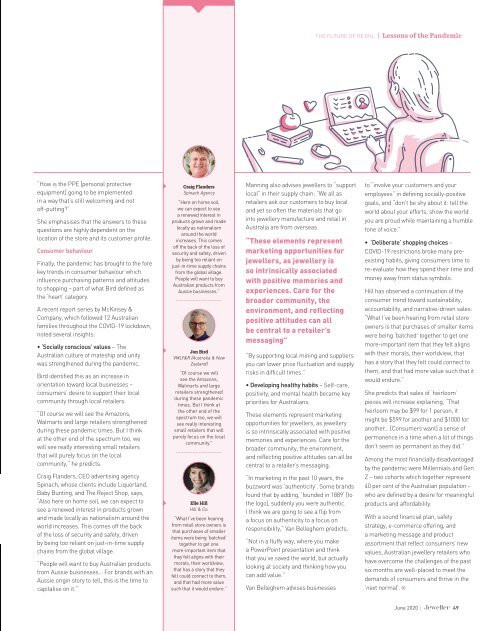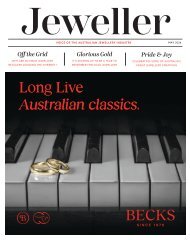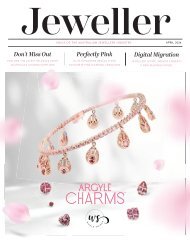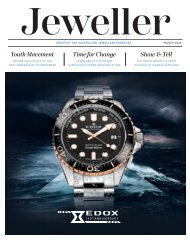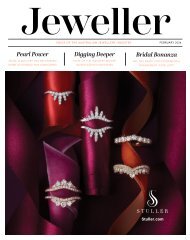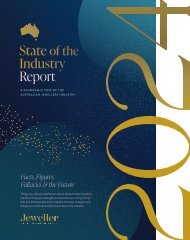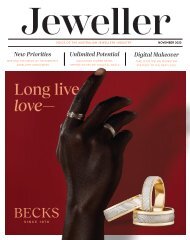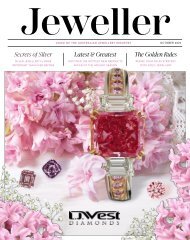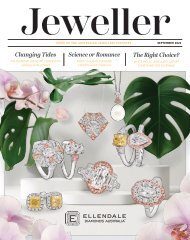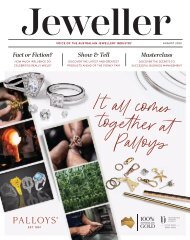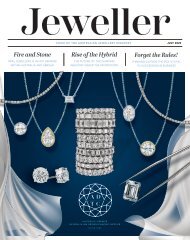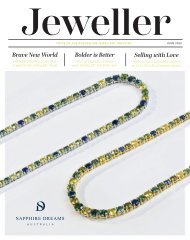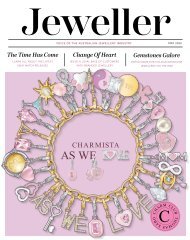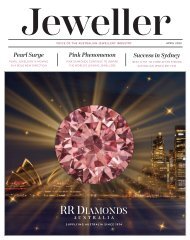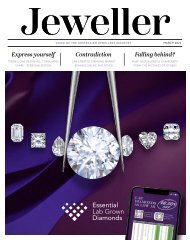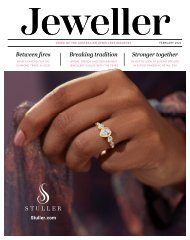Jeweller - June, Edition II 2020
• Shock value: How jewellers can adapt to and even benefit from the impact of COVID-19 • Brave new world: Preparing your business for the 'next normal' of retail • Double or nothing: experts reveal the key strategies to securing multiple-item sales
• Shock value: How jewellers can adapt to and even benefit from the impact of COVID-19
• Brave new world: Preparing your business for the 'next normal' of retail
• Double or nothing: experts reveal the key strategies to securing multiple-item sales
You also want an ePaper? Increase the reach of your titles
YUMPU automatically turns print PDFs into web optimized ePapers that Google loves.
THE FUTURE OF RETAIL | Lessons of the Pandemic<br />
“How is the PPE [personal protective<br />
equipment] going to be implemented<br />
in a way that’s still welcoming and not<br />
off-putting?”<br />
She emphasises that the answers to these<br />
questions are highly dependent on the<br />
location of the store and its customer profile.<br />
Consumer behaviour<br />
Finally, the pandemic has brought to the fore<br />
key trends in consumer behaviour which<br />
influence purchasing patterns and attitudes<br />
to shopping – part of what Bird defined as<br />
the ‘heart’ category.<br />
A recent report series by McKinsey &<br />
Company, which followed 12 Australian<br />
families throughout the COVID-19 lockdown,<br />
noted several insights:<br />
• ‘Socially conscious’ values – The<br />
Australian culture of mateship and unity<br />
was strengthened during the pandemic.<br />
Bird identified this as an increase in<br />
orientation toward local businesses –<br />
consumers’ desire to support their local<br />
community through local retailers.<br />
“Of course we will see the Amazons,<br />
Walmarts and large retailers strengthened<br />
during these pandemic times. But I think<br />
at the other end of the spectrum too, we<br />
will see really interesting small retailers<br />
that will purely focus on the local<br />
community,” he predicts.<br />
Craig Flanders, CEO advertising agency<br />
Spinach, whose clients include Liquorland,<br />
Baby Bunting, and The Reject Shop, says,<br />
“Also here on home soil, we can expect to<br />
see a renewed interest in products grown<br />
and made locally as nationalism around the<br />
world increases. This comes off the back<br />
of the loss of security and safety, driven<br />
by being too reliant on just-in-time supply<br />
chains from the global village.<br />
“People will want to buy Australian products<br />
from Aussie businesses... For brands with an<br />
Aussie origin story to tell, this is the time to<br />
capitalise on it.”<br />
Craig Flanders<br />
Spinach Agency<br />
“Here on home soil,<br />
we can expect to see<br />
a renewed interest in<br />
products grown and made<br />
locally as nationalism<br />
around the world<br />
increases. This comes<br />
off the back of the loss of<br />
security and safety, driven<br />
by being too reliant on<br />
just-in-time supply chains<br />
from the global village.<br />
People will want to buy<br />
Australian products from<br />
Aussie businesses.”<br />
Jon Bird<br />
VMLY&R (Australia & New<br />
Zealand)<br />
“Of course we will<br />
see the Amazons,<br />
Walmarts and large<br />
retailers strengthened<br />
during these pandemic<br />
times. But I think at<br />
the other end of the<br />
spectrum too, we will<br />
see really interesting<br />
small retailers that will<br />
purely focus on the local<br />
community.”<br />
Elle Hill<br />
Hill & Co.<br />
“What I’ve been hearing<br />
from retail store owners is<br />
that purchases of smaller<br />
items were being ‘batched’<br />
together to get one<br />
more-important item that<br />
they felt aligns with their<br />
morals, their worldview,<br />
that has a story that they<br />
felt could connect to them,<br />
and that had more value<br />
such that it would endure.”<br />
Manning also advises jewellers to “support<br />
local” in their supply chain: “We all as<br />
retailers ask our customers to buy local<br />
and yet so often the materials that go<br />
into jewellery manufacture and retail in<br />
Australia are from overseas.<br />
“These elements represent<br />
marketing opportunities for<br />
jewellers, as jewellery is<br />
so intrinsically associated<br />
with positive memories and<br />
experiences. Care for the<br />
broader community, the<br />
environment, and reflecting<br />
positive attitudes can all<br />
be central to a retailer’s<br />
messaging”<br />
“By supporting local mining and suppliers<br />
you can lower price fluctuation and supply<br />
risks in difficult times.”<br />
• Developing healthy habits – Self-care,<br />
positivity, and mental health became key<br />
priorities for Australians.<br />
These elements represent marketing<br />
opportunities for jewellers, as jewellery<br />
is so intrinsically associated with positive<br />
memories and experiences. Care for the<br />
broader community, the environment,<br />
and reflecting positive attitudes can all be<br />
central to a retailer’s messaging.<br />
“In marketing in the past 10 years, the<br />
buzzword was ‘authenticity’. Some brands<br />
found that by adding, ‘founded in 1889’ [to<br />
the logo], suddenly you were authentic.<br />
I think we are going to see a flip from<br />
a focus on authenticity to a focus on<br />
responsibility,” Van Belleghem predicts.<br />
“Not in a fluffy way, where you make<br />
a PowerPoint presentation and think<br />
that you’ve saved the world, but actually<br />
looking at society and thinking how you<br />
can add value.”<br />
Van Belleghem advises businesses<br />
to “involve your customers and your<br />
employees” in defining socially-positive<br />
goals, and “don’t be shy about it: tell the<br />
world about your efforts, show the world<br />
you are proud while maintaining a humble<br />
tone of voice.”<br />
• ‘Deliberate’ shopping choices –<br />
COVID-19 restrictions broke many preexisting<br />
habits, giving consumers time to<br />
re-evaluate how they spend their time and<br />
money away from status symbols.<br />
Hill has observed a continuation of the<br />
consumer trend toward sustainability,<br />
accountability, and narrative-driven sales:<br />
“What I’ve been hearing from retail store<br />
owners is that purchases of smaller items<br />
were being ‘batched’ together to get one<br />
more-important item that they felt aligns<br />
with their morals, their worldview, that<br />
has a story that they felt could connect to<br />
them, and that had more value such that it<br />
would endure.”<br />
She predicts that sales of ‘heirloom’<br />
pieces will increase explaining, “That<br />
heirloom may be $99 for 1 person, it<br />
might be $599 for another and $1000 for<br />
another... [Consumers want] a sense of<br />
permanence in a time when a lot of things<br />
don’t seem as permanent as they did.”<br />
Among the most financially disadvantaged<br />
by the pandemic were Millennials and Gen<br />
Z – two cohorts which together represent<br />
40 per cent of the Australian population –<br />
who are defined by a desire for meaningful<br />
products and affordability.<br />
With a sound financial plan, safety<br />
strategy, e-commerce offering, and<br />
a marketing message and product<br />
assortment that reflect consumers’ new<br />
values, Australian jewellery retailers who<br />
have overcome the challenges of the past<br />
six months are well-placed to meet the<br />
demands of consumers and thrive in the<br />
‘next normal’.<br />
<strong>June</strong> <strong>2020</strong> | 49


